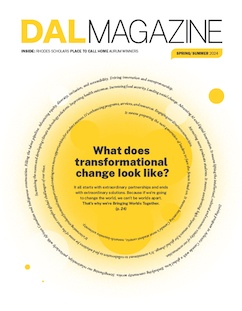When Sarah Harding (LLBâ89) arrived at Dalhousie the first time, as a law student, she was joining a community reeling from the devastating 1985 Weldon Law Building fire. Most of the schoolâs usual space was unusable, forcing everyone into close quarters for work and study.
âI donât know if it was because of that, or maybe itâs just deep in the schoolâs nature, but I found such a strong and amazing community, full of smart, interesting, and supportive peers and teachers,â says Prof. Harding. âIt was just a formative time for me.â
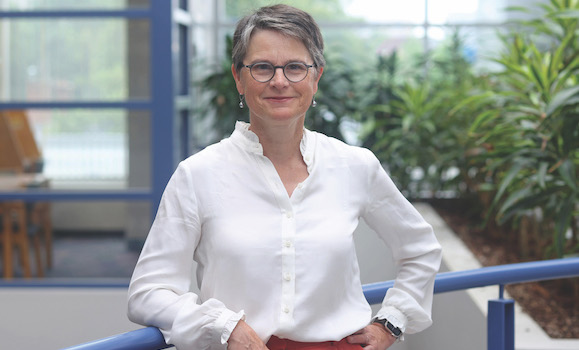
Dean of Law Sarah Harding (Nick Pearce photos)
As she was nearing graduation, one of those teachers suggested she apply for a Rhodes Scholarship. The thought had never crossed her mind; she already had a law firm job lined up in Toronto after graduation. But months later, there she was, flying off to the United Kingdom to begin advanced legal studies at one of the worldâs oldest and most renowned universities.
âThe Rhodes definitely set me off on a path in multiple ways,â she says. âI started thinking at Oxford that I might want to be an academic; I just thought I was going to be a lawyer before that. And I met my husband at Oxford. He was also a Rhodes Scholar, and an American, and that set me on a different path as well.â
She would go on to spend nearly three decades as a law professor and associate dean at Chicago-Kent College of Law before coming out of retirement in 2023 to return to Dalhousie as dean of the Schulich School of Law. She says she loves being back among students and getting to connect with colleagues new and familiar, and that while the law school has changed in many ways, some things remain the same â particularly, the âWeldon traditionâ of service that defines the schoolâs character.
âThat idea of unselfish public service permeates the culture,â says Prof. Harding. âAnd that idea of leadership in the service of others, itâs there in the Rhodes as well â the whole mantra of âfighting the good fight.ââ
Further reading:Â New Schulich School of Law dean shares motivations and vision

The road to Rhodes
Most people donât know the mantras of scholarships. Heck, most scholarships donât even have mantras. But few scholarships are quite like the Rhodes.
Established at the turn of the 20th century through the will of British colonial magnate Cecil Rhodes, the Rhodes Trust has allowed nearly 8,000 young people from around the world the life-changing opportunity to study at the University of Oxford for up to three years, all expenses paid. The scholarship recognizes not only academic achievement but character, extracurricular involvement, commitment to social good â that âfighting the good fight,â now expressed by the Rhodes Trust as âstanding up for the world.â Open to scholars across disciplines, the Rhodes has immense prestige and renown partly from being the worldâs oldest international scholarship program, but largely through the success of its alumni, including individuals like Bill Clinton, Kris Kristofferson, Chrystia Freeland, and Bob Rae, to name a few.
As youâd expect, large numbers of Rhodes Scholars have come from universities like Harvard, Yale, Princeton, McGill. But right in their midst is Dalhousie, ranking among the top 10 schools in North America for producing Rhodes Scholars. Dal students have been selected as Rhodes Scholars 94 times and counting â a rather oversized portion of the more than 1,000 Canadians selected for the honour since 1904. Their ranks have included premiers and politicians, renowned professors and professionals â a living legacy of contributions to Canada and the world.
Dal Rhodes alumni through the years
Why is Dal so well represented among Rhodes alumni? One reason is that Dalhousie has been around for the scholarshipâs entire 120-year history. Another is that the Maritime provinces are allocated two of Canadaâs 11 Rhodes Scholarships each year, so it makes sense that Dalhousie, the regionâs largest university, would do well in producing Rhodes candidates.
But when you talk to alumni whoâve succeeded in the Rhodes application and interview process, they also talk about how the education they received at Dalhousie aligned with the values at the forefront of the Rhodes criteria.
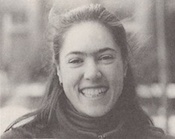 âRhodes is about being a force for good, and Dalhousie set me on the right path to explore and embody that ideal,â says past recipient Carol-Ann Brown (BAâ97). âDal provided excellent teaching, access to a plethora of activities outside of academics, and the space to support others.â
âRhodes is about being a force for good, and Dalhousie set me on the right path to explore and embody that ideal,â says past recipient Carol-Ann Brown (BAâ97). âDal provided excellent teaching, access to a plethora of activities outside of academics, and the space to support others.â
Brown, president of the global sustainability consulting firm Delphi, says her Rhodes experience accelerated her capacities to be a force for change. âThe wonderful experience I had at Dalhousie was foundational to being able to absorb what Oxford had to offer â and to the belief that I could make a difference in the world.â
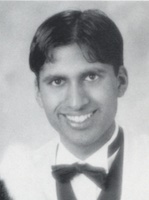 Audri Mukhopadhyay (BAâ95) likens the Oxford opportunity to being given a ticket to an intellectual theme park. âYou have Disney for kids, Las Vegas for gamblers, and Oxford for academics and scholarship,â he says. âItâs just this awesome place full of little âah-haâ moments everywhere.â
Audri Mukhopadhyay (BAâ95) likens the Oxford opportunity to being given a ticket to an intellectual theme park. âYou have Disney for kids, Las Vegas for gamblers, and Oxford for academics and scholarship,â he says. âItâs just this awesome place full of little âah-haâ moments everywhere.â
Mukhopadhyay subsequently pursued a career as a diplomat with Global Affairs Canada and is currently director for Southeast Asia and Oceania. But heâs remained engaged with some of the Rhodes connections he made through and after Oxford, like many Rhodes alumni tend to do. âThere are lots of interesting people in a variety of fields,â he says of the Rhodes community. âYou can gain insights into disparate fields, within a culture of curiosity, of exploration.â
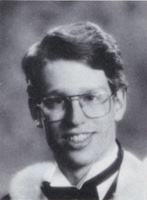 Graham Flack's (BAâ88, LLBâ93) Rhodes experience also led him toward public service. Recently retired after a distinguished 30-year career with the federal government, including serving as deputy minister across multiple portfolios (most recently Secretary of the Treasury Board), he recalls how the college-based approach, immersive setting, and intense focus of his studies at Oxford shaped his experience there and some of how heâs approached problem-solving in his public-service career. âThere isnât always âexaminableâ material, so you have to draw on a range of sources,â he says, âand itâs up to you to identify what they are and synthesize them in a way thatâs coherent.â
Graham Flack's (BAâ88, LLBâ93) Rhodes experience also led him toward public service. Recently retired after a distinguished 30-year career with the federal government, including serving as deputy minister across multiple portfolios (most recently Secretary of the Treasury Board), he recalls how the college-based approach, immersive setting, and intense focus of his studies at Oxford shaped his experience there and some of how heâs approached problem-solving in his public-service career. âThere isnât always âexaminableâ material, so you have to draw on a range of sources,â he says, âand itâs up to you to identify what they are and synthesize them in a way thatâs coherent.â
Another aspect of the Rhodes experience that still resonates with Flack today is being among a global community of scholars at key moments in history. âWhen I was there, it was when the Berlin Wall came down,â he recalls. âI was doing a course on Eastern European politics with one of the leading experts on the topic and literally his entire worldview was changing over the 10 weeks of the course. So much of the currency of the place was the issues of the day.â
Of course, even as history is happening around you, studying at the University of Oxford is an historic experience in and of itself.
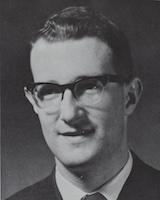
âWe think of Dalhousie as an old school, and then you look at England and parts of Europe and youâre talking hundreds and hundreds and hundreds of years,â says George Cooper (BSCâ62, LLBâ65, LLDâ04). Cooper was a Rhodes Scholar in the mid-1960s and attended University Collegeâone of the more than 30 individual colleges that make up the University of Oxford. âYouâre walking through the halls of the school [Percy] Shelley was thrown out of. Stephen Hawking went there, C.S. Lewis, Bill Clinton later on.â
Cooper is a second-generation Rhodes Scholar; his father was also one, and his grandfather grew up in England not far from Oxford. Cooperâs contributions to Dalhousie have been legion â as an alum, a donor, board member, managing trustee of the Killam Trusts, and as president of the University of Kingâs College â and he draws a link between that drive to give back to higher education and his Rhodes experience.
âThe purpose stated in Mr. Rhodesâs will for this scholarship was to try and bring along people who are interested in making some aspect of public life part of their career,â he says. âAnd the way he framed it was for menâit was men in those daysâwho esteem as their highest calling the performance of public duty. He didnât necessarily mean electoral politics, but also working in the civil service, in a university, whatever else might represent a public good. So that really stuck with me as being something that I ought to do.â
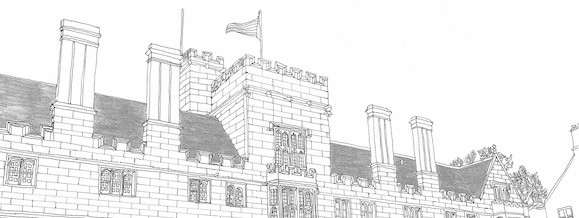
Changing the game for the world's most famous scholarship
Today, the criteria to become a Rhodes Scholar are still founded in same principles that were in place 120 years ago, but the expression and application of them has changed a great deal.
As Cooper indicates, women werenât accepted as Rhodes Scholars for much of the scholarshipâs history; that only changed in 1977. Though always open to individuals of different racial backgrounds, the scholarshipâs lack of diversity over the years has been controversial, especially in the era of apartheid South Africa when applicants from that country were restricted to select white-only private secondary schools. And, more broadly, the scholarship has had to struggle to escape the shadow of its founder and namesake, whose views on race and empire not only aligned with but helped fuel the colonial enterprise of his era.
All this is to say that someone like Sierra Sparks (BENG'21) â an African Nova Scotian Engineering graduate â might not be who Cecil Rhodes imagined when he first thought up a global scholarship program. But she embodies what the Rhodes has become today, through its current students and more recent alumniâa more inclusive, more representative group of scholars with a broader perspective on what it means to build capacity for the public good.
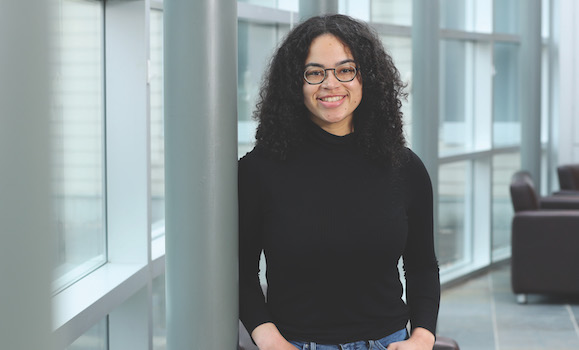
Sierra Sparks. (Nick Pearce photo)
âYouâre part of this group of about 100 people each year, all from different countries, and itâs such a cool experience to meet people from places Iâve never been,â says Sparks, who is currently in her third year of her doctoral degree in biomedical engineering. âItâs been so enriching.â
Sparks has gotten to travel across Europe, dive deeper into her research into risk indicators for Alzheimerâs disease, and even got to take part in the Rhodesâs 120th anniversary celebrations last year, in which hundreds of former scholars made their way back to Oxford.
âItâs honestly been much more of a social experience than I was expecting, those connections. Itâs been great meeting so many people. Thereâs just always something going on.â
Further reading:Â How new Rhodes Scholar Sierra Sparks brings community to life
Finding their way back
Though a Rhodes Scholarship opens up a world of connection and possibility, a number of scholars â just like Schulich Law Dean Sarah Harding â eventually find their way back to the university that launched them toward Oxford in the first place.
Some have become notable Dal faculty members, including Law prof Dr. Arthur Foote (LLBâ54), classicist James Doull (BAâ39), and Physics chair Dr. R. H. March (MSCâ60). Others, like President Henry Hicks (BSCâ37), have taken on prominent administrative roles. Guy MacLean (BAâ51, MAâ53), who was dean of both Graduate Studies and Arts & Sciences before becoming vice-president academic & research, is another exampleâand his counsel and guidance shaped Dr. Denis Stairs's (BA'61) decision to pursue his own Rhodes Scholarship.
âHe really encouraged me to apply, though I expected nothing of it,â says Dr. Stairs, who would go on to become a renowned political scientist at Dalhousie specializing in Canadian foreign policy and defence â and served as vice-president academic & research, just like Dr. MacLean before him.
âI didnât necessarily expect to stay at Dalhousie either,â adds Dr. Stairs, but he says Dr. MacLeanâs continued support was part of making him feel welcome back in Halifax. âHe was very supportive of younger people who he thought might be of some use, and I simply found myself enjoying it very much, especially working with students.â
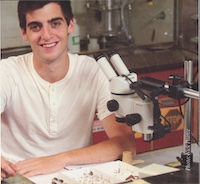 For Dr. Paul Manning (BSCâ13), the first Rhodes Scholar from the Faculty of Agriculture in Truro, the journey back to campus was a little bit about family and a lot of good fortune â the opportunity to live in and give back to the community, and school, that helped shape his own path.
For Dr. Paul Manning (BSCâ13), the first Rhodes Scholar from the Faculty of Agriculture in Truro, the journey back to campus was a little bit about family and a lot of good fortune â the opportunity to live in and give back to the community, and school, that helped shape his own path.
âI really care deeply about the success of this campus and the students here,â says Dr. Manning, an assistant professor in the Department of Plant, Food, and Environmental Science who studies insects and their importance to agricultural ecosystems. âItâs an important personal connection for me â as an alum, you want to see your alma mater succeed. It continues to be a true privilege and pleasure to contribute to research and teaching here.â
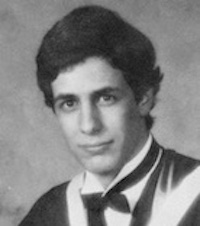 Dr. Andrew Lynk (MDâ82), department chair and chief of pediatrics at Dalhousie and IWK Health, took a longer path back to Dalhousie. He credits his Rhodes experience with opening his eyes to the world, sending him off to work in famine relief in Ethiopia before returning to Nova Scotia to serve Cape Breton as a pediatrician for over 25 years. Since returning to Dal and to Halifax in 2016, heâs embodied another Rhodes trend: connecting with newer scholars to offer his best advice and counsel from his own Rhodes experience.
Dr. Andrew Lynk (MDâ82), department chair and chief of pediatrics at Dalhousie and IWK Health, took a longer path back to Dalhousie. He credits his Rhodes experience with opening his eyes to the world, sending him off to work in famine relief in Ethiopia before returning to Nova Scotia to serve Cape Breton as a pediatrician for over 25 years. Since returning to Dal and to Halifax in 2016, heâs embodied another Rhodes trend: connecting with newer scholars to offer his best advice and counsel from his own Rhodes experience.
âThe world we live in has a lot of existential challenges right now, lots of threats and opportunities, and more than ever we need strong ethical leadership,â says Dr. Lynk. âSo when you run into young folksâbe they accomplished pediatric residents or medical students, or people who are applying for or have received a Rhodes Scholarshipâthese are the leaders of tomorrow. If I can use the privilege and opportunity Iâve had and help mentor these accomplished young folks who are going to help shape and change that world, thatâs what I need to do.â
Continuing the legacy
When Diana Adamo (BSCâ24) was announced as Dalhousieâs 94th Rhodes Scholar last year, Dr. Lynk reached out to congratulate her and offer any advice he could. So, too, did Sierra Sparks, along with several other current and past scholars. Their counsel has been welcome, given that Adamo â who has never travelled outside of Canada before â is about to embark on a journey unlike anything sheâs ever experienced before.
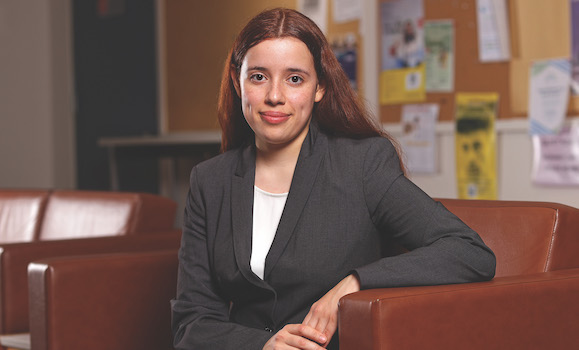
Diana Adamo. (Nick Pearce photo)
âI just got thrown into everything and didnât really have much time to think,â she says, referring to the flurry of activity that comes from not only applying and interviewing for the Rhodes, but the process and paperwork necessary once youâre successful. âNow Iâm just realizing how exciting itâs going to be. Iâve been looking into my future research, Iâve gotten my first acceptance letter to one of the Oxford colleges, and now Iâm just trying to enjoy it while also focusing on completing the term.â
Some Rhodes Scholars come from great privilege, but for Adamo â who grew up in poverty, witnessing domestic abuse â opportunities like her Dalhousie entrance scholarship, and now her Rhodes Scholarship, are truly life-changing. They empower her drive to understand how societies and health-care systems can better support people with the sorts of neurodevelopmental disorders her family has struggled with. They make the fight, the effort to stand up for others, a little more achievable.
âIâm excited for the opportunity to learn more and really be pushed to question what I know and how I know it,â she says. âItâs about a new perspective, and Iâm eager to dive deep into that critical analysis space of my academic career and really grow as a thinker and a researcher.â
Further reading:Â Dianaâs golden ticket: Dalâs newest Rhodes Scholar is Oxfordâbound on a lifeâchanging opportunity
This story appeared in the DAL Magazine Spring/Summer 2024 issue. Flip through the rest of the issue using the links below.

